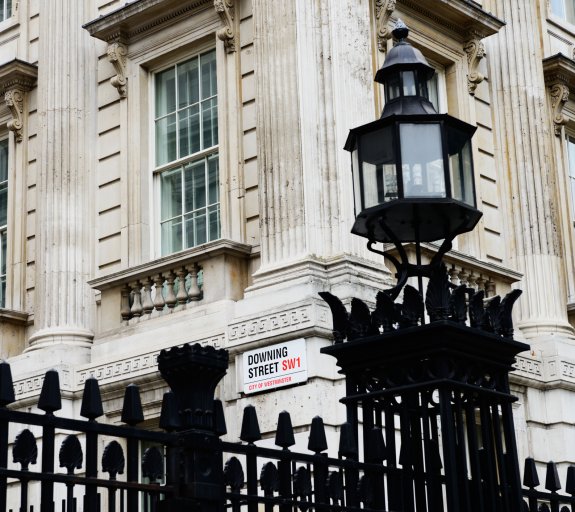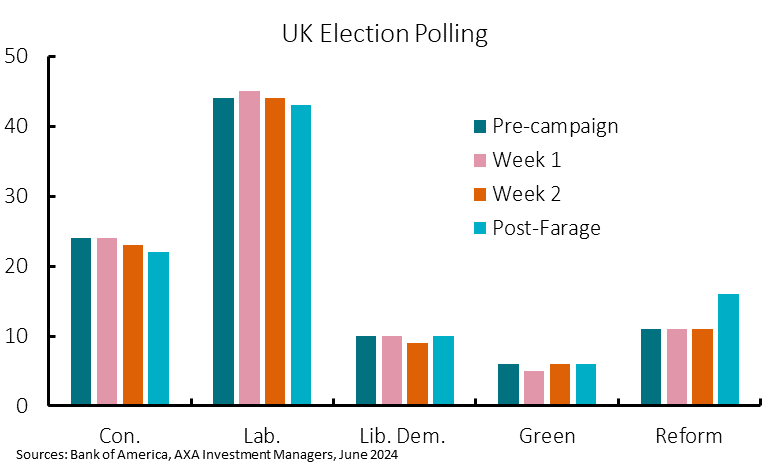
UK Election Watch: Nigel Farage enters the race, boosting Reform UK
- 07 Junio 2024 (3 min de lectura)
The Debate
The two main candidates for Prime Minister went head-to-head earlier this week in the first debate of the campaign. The immediate outcome was close, with a YouGov poll putting Rishi Sunak marginally ahead of Keir Starmer, with 51% of the vote, compared to 49%. But the controversy surrounding potential tax increases under a Labour government dwarfed the event. Rishi Sunak repeatedly stated throughout Tuesday’s debate that if Labour were to be elected, households would be hit with a £2000 tax increase, a figure he said had been calculated by the Treasury.
This has subsequently been widely discredited, with the Permanent Secretary to the Treasury stating it should not be presented as an official estimate, given that the department was “not involved in the production or presentation of the Conservative Party’s document ‘Labour’s Tax Rises’ or the calculation of the total figure used”. In addition, the Office for Statistics Regulation has said that as well as being clearer on the source of the figure, Mr Sunak should have made it known that the figure reflected the total over a four-year period, not annually as implied during the debate. The PM has denied misleading people and is standing by the figure; Starmer consistently dismissed the figure as untrue and “garbage”.
The Vote Split
The Conservative party faced a further blow this week, as former Brexit Party leader Nigel Farage threw his hat in the ring, taking over as leader of Reform UK and putting himself forward as a candidate in the Essex constituency of Clacton. He ruled out this exact possibility just three weeks ago. The move has spurred the first major shift in the polls since the election was called, with each of the seven polls since the announcement showing a marked increase in support for Reform. Indeed, Reform UK have gained between four to five points on average and are now polling around 16%, only six points behind the Conservative Party.

The Impact
Growing support for Reform UK, however, does not appear to be impacting the Labour lead, meaning a sizeable Labour majority is still the most likely outcome. The latter has maintained its 20 to 22 point lead this week, with most of the increase in support for Reform UK coming from the Right of the political spectrum. Indeed, this mirrors some recent by-election results where Reform’s vote almost matched the Conservative vote and has appeared to contribute to losses of seats with considerable leads.
We have written about the macro implications of a Labour majority over the past couple of weeks. Insofar as recent polling suggests Labour continues to be on track for a comfortable to large majority with less than four weeks to go to the election, we see little macroeconomic variation from these scenarios. We only see a macroeconomically different outcome if the Labour majority was much smaller, but this currently looks unlikely. We will provide a full analysis of the macroeconomic impact in our upcoming Election Preview.
Disclaimer
La información aquí contenida está dirigida exclusivamente a inversores/clientes profesionales, tal como se establece en las definiciones de los artículos 194 y 196 de la Ley 6/2023, de 17 de marzo, de los Mercados de Valores y de los Servicios de Inversión.
Este documento tiene fines informativos y su contenido no constituye asesoramiento financiero sobre instrumentos financieros de conformidad con la MiFID (Directiva 2014/65 / UE), recomendación, oferta o solicitud para comprar o vender instrumentos financieros o participación en estrategias comerciales por AXA Investment Managers Paris, S.A. o sus filiales.
Las opiniones, estimaciones y previsiones aquí incluidas son el resultado de análisis subjetivos y pueden ser modificados sin previo aviso. No hay garantía de que los pronósticos se materialicen.
La información sobre terceros se proporciona únicamente con fines informativos. Los datos, análisis, previsiones y demás información contenida en este documento se proporcionan sobre la base de la información que conocemos en el momento de su elaboración. Aunque se han tomado todas las precauciones posibles, no se ofrece ninguna garantía (ni AXA Investment Managers Paris, S.A. asume ninguna responsabilidad) en cuanto a la precisión, la fiabilidad presente y futura o la integridad de la información contenida en este documento. La decisión de confiar en la información presentada aquí queda a discreción del destinatario. Antes de invertir, es una buena práctica ponerse en contacto con su asesor de confianza para identificar las soluciones más adecuadas a sus necesidades de inversión. La inversión en cualquier fondo gestionado o distribuido por AXA Investment Managers Paris, S.A. o sus empresas filiales se acepta únicamente si proviene de inversores que cumplan con los requisitos de conformidad con el folleto y documentación legal relacionada.
Usted asume el riesgo de la utilización de la información incluida en este documento/ material audiovisual. La información incluida en este documento/ material audiovisual se pone a disposición exclusiva del destinatario para su uso interno, quedando terminantemente prohibida cualquier distribución o reproducción, parcial o completa por cualquier medio de este material sin el consentimiento previo por escrito de AXA Investment Managers Paris, S.A.
Queda prohibida cualquier reproducción, total o parcial, de la información contenida en este documento.
Por AXA Investment Managers Paris, S.A., sociedad de derecho francés con domicilio social en Tour Majunga, 6 place de la Pyramide, 92800 Puteaux, inscrita en el Registro Mercantil de Nanterre con el número 393 051 826. En otras jurisdicciones, el documento es publicado por sociedades filiales y/o sucursales de AXA Investment Managers Paris, S.A. en sus respectivos países.
Este documento ha sido distribuido por AXA Investment Managers Paris, S.A., Sucursal en España, inscrita en el registro de sucursales de sociedades gestoras del EEE de la CNMV con el número 38 y con domicilio en Paseo de la Castellana 93, Planta 6 - 28046 Madrid (Madrid).
© AXA Investment Managers Paris, S.A. 2024. Todos los derechos reservados.
Advertencia sobre riesgos
El valor de las inversiones y las rentas derivadas de ellas pueden disminuir o aumentar y es posible que los inversores no recuperen la cantidad invertida originalmente.